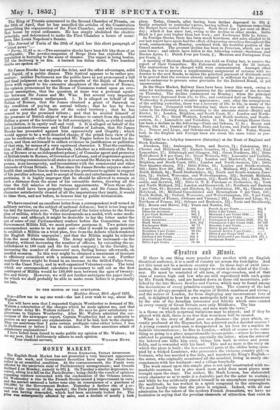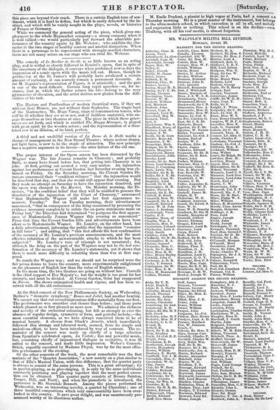i gratrts nut( 31ittoir.
If there is one thing more popular than another with an English theatrical audience, it is a sniff of country air across the foot-lights. And yet this must not be a modern country air. In these days of swift loco- motion, the really rural seems no longer to exist in the mind of the Cock- ney. He must be reminded of old inns, of stage-coaches, and of that class of rustics high and low who are still reproduced with such gusto by Mr. Frank Stone, and are handed down in those old mezzotints, pub- lished by the late Messrs. Bowks and Carver, which may be found among the decorations of every primitive country inn. The country of the last century is always accepted as the region of British manliness and virtue ; and the native of London, far from displaying any inconvenient love of soil, is delighted to hear his own metropolis held up as a Pandemonium by the side of the Arcadian innocence and felicity which once existed in every county of Great Britain save only Middlesex. The lino
"God made the country, and man made the town," is a theme on which perpetual variations may be played; and if they be played with skill, there is no fear that weariness will be created. What is the story of Mind your own Business—the piece which, re- cently produced at the Haymarket, has achieved such a decided success ? A young country gentleman is disappointed in his love for a maiden in humble circumstances ; he flies to London,—which of course is the same thing as going to a place unmentionable to ears polite,—where he becomes addicted to gaming and drinking, especially the latter; when the sister of the beloved one talks him over, brings him back to virtue and green fields, and is rewarded with his hand. This and no more is the Amy on which the piece is built ; the less essential parts of the edifice being occu- pied by a wicked Londoner, who persecutes the virtuous country girl—a footman, who has married a fine lady, and murders the King's English— the sister, who originally occasioned all the mischief, living in needy cir- cumstances with her husband—and a village busybody. The work raised upon this simple plan is not only constructed with re- markable neatness, but is also much more solid than most pieces now brought upon the stage. The author, Mr. Mark Lemon, has elaborated every character so as to make it a desirable part for the actor to sustain ; and while he has artificially placed himself in an atmosphere congenial to the multitude, he has worked in a spirit congenial to the atmosphere. We need hardly state that the piece is original. Indeed, with all our admiration for the talent of the modern French dramatists, we have no hesitation in saying that the peculiar elements of attraction that exist in this piece are beyond their reach. There is a certain English tone of sen- timent, which it is hard to define, but which is easily detected by the in- stinct, and which will be vainly sought in the plays, novels, or histories of France or Germany. While we commend the general acting of the piece, which gives em- ployment to the whole Haymarket company—a strong company when it is well rallied—we would particularly put forward the admirable per- formance of the country squire by Mr. Webster; who exhibits the cha- racter in the two stages of healthy content and morbid dissipation. When there is a personage to be represented with strongly-marked characters, there are not many actors on our stage who can rival Mr. Webster.



























 Previous page
Previous page